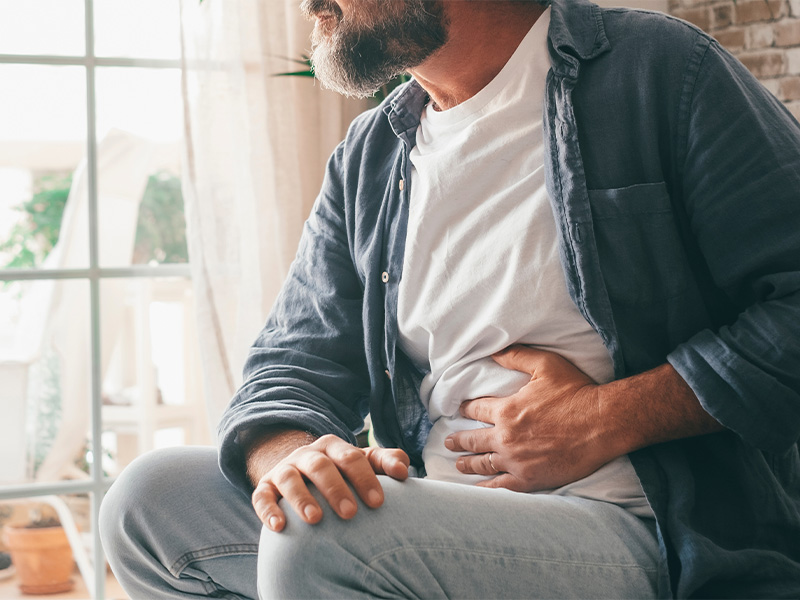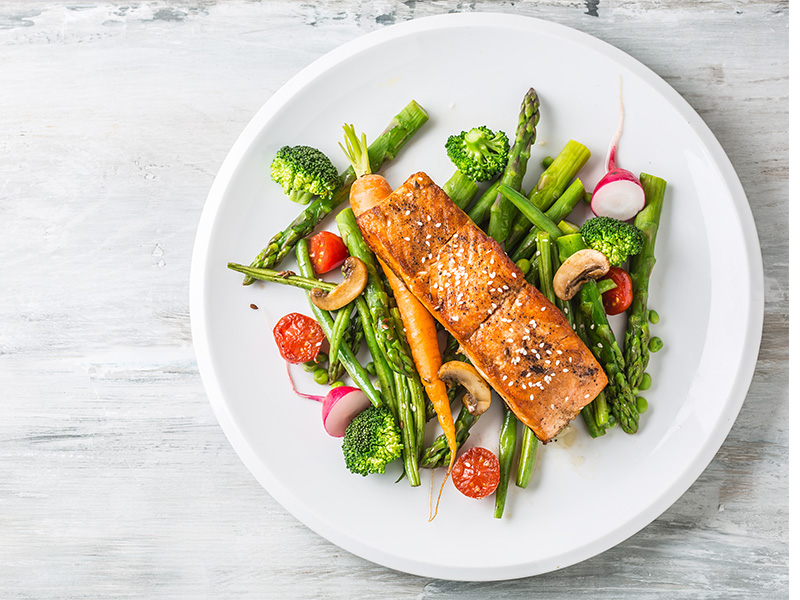Upper abdominal pain is certainly no fun, whether it strikes after you’ve eaten a meal or you’ve skipped one! Here, a Singapore surgeon shares some insights into its causes and symptoms.
According to surgeon DR THNG YONGXIAN, upper abdominal pain can result from a variety of causes, but there are a few common culprits. “Upper abdominal pain can be caused by gallstones within the gallbladder (especially after eating fatty foods), stomach inflammation or gastritis,” he says. “Less commonly, it could result from liver growths in the left lobe, pancreatitis, or inflammation of the transverse colon.”

He also notes that upper abdominal pain is often mistaken for post-meal indigestion. The latter can cause discomfort or belly pain unrelated to any underlying disease.
Recognising symptoms and telling them apart
How can we identify the symptoms and causes of upper abdominal pain, and what warning signs should we look out for? Dr Thng explains:
- Gallstones: Typically, gallstones cause pain after a heavy or oily meal.
- Gastritis: Gastric pain often occurs when the stomach is empty or when you have skipped meals.
- Pancreatitis: The pain tends to radiate to the back and gets relieved when bending forward.
- Liver growths: These tend to occur more often in individuals with chronic hepatitis B or C.

When to consult a doctor
Living with upper abdominal pain isn’t just inconvenient. It can turn into a cycle of discomfort, not only affecting your quality of life but also your attitude towards food. “Gallstones can lead to a fear of certain foods. One could also experience severe pain after meals, often accompanied by bloating,” explains Dr Thng. “This significantly impacts the quality of life.”
Moreover, upper abdominal pain can signal something more serious. That is why Dr Thng recommends seeking help as early as possible. “If the pain keeps recurring or gets progressively worse, it’s a clear sign you should visit a doctor.” Ignoring the pain and waiting for it to go away on its own isn’t a great idea, since some of these underlying causes can worsen if left untreated.

Treatment options – you don’t always need surgery
The good news? Surgery isn’t always necessary for upper abdominal pain. Dr Thng tells us that treatment depends on the underlying cause of the pain. “The first step is always to come up with the correct diagnosis. This might involve scans or diagnostic investigations,” he explains. “Depending on the condition, a trial of medical therapy is often first attempted to alleviate the symptoms. Surgery is only considered in situations where it is not amenable to medical therapy.”
Indeed, this approach aligns with his overall philosophy, which focuses on understanding each patient’s unique case and thoroughly exploring minimally invasive treatment methods. “We often seek to clinch the correct diagnosis through the appropriate investigations. If amenable, we offer a trial of medical therapy. Similarly, we only consider surgery when medication fails to treat the issue.”
Lifestyle factors and foods that can worsen upper abdominal pain
If you’re suspecting that certain habits and foods can exacerbate upper abdominal pain, you’re right! Dr Thng explains that fatty foods are a known aggravator for gallstone related discomfort. So yes, it might be time to cut down on those juicy burgers, cheesy pastas and baked treats. Meanwhile, smoking and skipping meals can worsen gastritis. Alcohol consumption is another culprit, particularly for triggering pancreatitis.
Preventing and managing upper abdominal pain
Prevention is always better than cure, and managing upper abdominal pain starts with some smart lifestyle changes. Being mindful of your triggers can be an important part of managing your upper abdominal pain beyond medication and visits to the doctor. Dr Thng recommends the following:
- A proper diagnosis is crucial, so book an appointment with your doctor.
- For those dealing with gastritis, maintaining regular meal times and using gastric protective medications that protect the stomach lining can reduce symptoms.
- Avoid rich, processed and fatty foods if you have gallstones.
- Reducing smoking and alcohol is equally important for improving overall digestive health.
About the doctor
Dr Thng Yongxian is a dual fellowship-trained hepatopancreatobiliary (HPB) surgeon and general surgeon. He has more than 16 years of experience in managing hepatopancreatobiliary, gastrointestinal and general surgical diseases.
#08-06 Mount Elizabeth Hospital Medical Centre, 3 Mount Elizabeth
9838 5827 | drthngyongxian.com | yongxian.thng@nexussurgical.com
This article first appeared in the January 2025 edition of Expat Living. You can purchase the latest issue or subscribe so you never miss a copy!
To make the most of living in Singapore, read our latest City Guide here for free!
Don't miss out on the latest events, news and
competitions by signing up to our newsletter!
By signing up, you'll receive our weekly newsletter and offers which you can update or unsubscribe to anytime.



